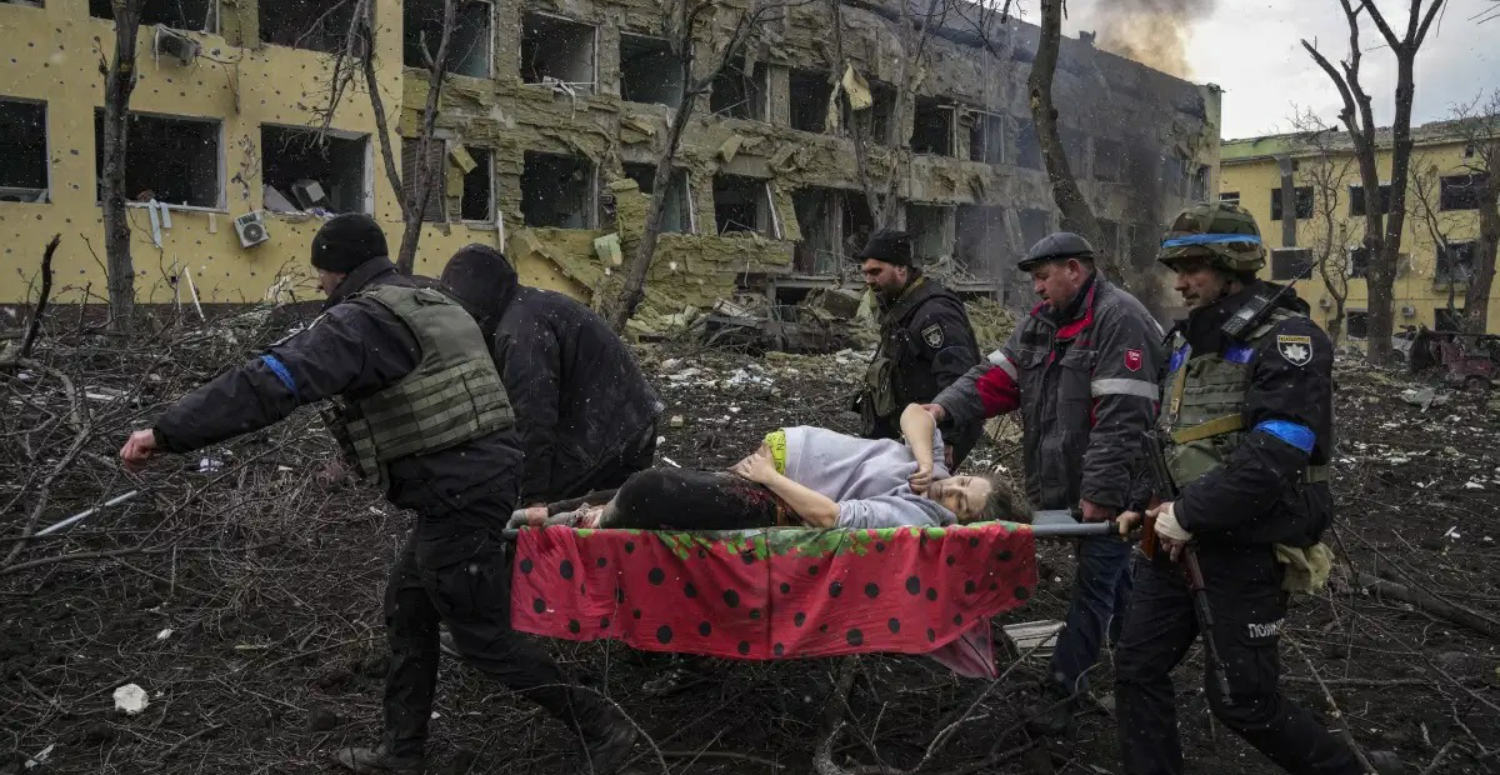20 Jours à Marioupol
[Docu]
20 днів у Маріуполі – 20 dniv u Mariupoli
(20 Days in Mariupol)
Best Documentary – BAFTA
Best Documentary – Oscars
Outstanding Documentary – DGA
2023/2024

FR EN
Alors que la troisième année de la guerre russo-ukrainienne ne fait que commencer, un puissant documentaire revenant sur les premiers jours du conflit sort en France, actuellement disponible sur France.tv. Prix du public au festival de Sundance où il fut présenté en janvier 2023, puis récemment récompensé aux BAFTA et bientôt également aux Oscars, du Prix du meilleur documentaire de l’année, « 20 jours à Marioupol » est un film dur, poignant, oppressant … les mots manquent pour qualifier cette œuvre coup de poing !
Les rares images du siège de Marioupol c’est à eux qu’on les doit : Mstyslav Chernov et Evgeniy Maloletka, journalistes ukrainiens de l’agence Associated Press. Ils sont les seuls représentants de la presse internationale restés après l’invasion russe en février 2022 dans cette ville portuaire du sud de l’Ukraine considérée comme stratégique en raison de son emplacement sur la mer d’Azov. Après avoir couvert les guerres d’Irak, d’Afghanistan et du Haut-Karabakh, les deux journalistes se retrouvent donc à filmer leur propre pays, à 30km de chez eux.
Traqués par les Russes, ils documentent pendant vingt jours le supplice des habitants coupés du monde, privés de réseaux téléphoniques, d’électricité, d’eau, de chauffage, de nourriture et soumis aux bombardements incessants des troupes Z. L’absence d’informations a à la fois permis d’installer un chaos général mais aussi une véritable impunité. C’est pourquoi ils ont risqué leur vie pour rompre le silence et transmettre ces images, ces témoignages, ces preuves. C’est tout simplement un document pour l’histoire, qui sert de contre-argument à la machine propagandiste russe et leur a valu un Prix Pulitzer. C’est non seulement un témoignage essentiel d’une réalité, une œuvre de courage, mais aussi une réflexion sur la responsabilité d’un reporter de guerre et sur l’impact (souhaité et/ou réel) d’un tel journalisme à l’échelle mondiale.
C’est évidemment un récit très fort et déchirant, mais c’est aussi un documentaire construit comme un thriller où la pression monte progressivement et dont le suspense crée une tension supplémentaire aux actes de guerre eux-mêmes qui ont réduit au silence quelques 450.000 voix. La narration et les choix quotidiens des deux protagonistes (ainsi que leurs implications pour les autres) renforcent le poids des images, en particulier quand l’obligation morale et professionnelle de presse signifie à la fois relayer la vérité mais aussi abandonner des vies. Et au-delà des images, des sons, et des discours effarants et effrayants, l’impact de ce témoignage est aussi sous-jacent lorsque des enfants, voire des bébés, arrivent progressivement à s’endormir ou rester calmes au milieu des bombardements quand les adultes sont en pleurs ou tétanisés. Est-ce vraiment une enfance ? Et quelles seront les conséquences futures d’une telle enfance ?
Même si factuellement parlant, on ne découvre rien dans la mesure où ces images sont justement parvenues à la presse internationale, on ne peut toutefois en sortir indemne. C’est un choc tout simplement, mais moins par ses dimensions didactique ou thriller – qui sont certes cruciales – que par sa force symbolique où l’on remet en perspective les ’20 jours’ du titre à l’entame d’une troisième année de guerre.
Après « Pierre, Feuille, Pistolet » sorti il y a quelques mois, voici donc un nouveau documentaire sur la tragédie ukrainienne. Un film difficile à regarder, qui nous plonge non seulement dans l’enfer mais fait aussi le siège de notre conscience. On en ressort définitivement secoué, silencieux, presque abattu quelque part. Ainsi, même si l’on sait déjà ce qui a pu se passer à Marioupol, le voir et le ressentir n’est pas la même chose. A la sortie on n’est plus vraiment le même, les priorités ne sont plus vraiment les mêmes : “s’il est vrai que les films ne changent pas le monde, ils peuvent changer notre rapport au monde” (K. Ben Hania) …
As the Russian-Ukrainian war enters its third year, a powerful documentary about the early days of the conflict gets released in France. Winner of the Audience Award at the Sundance Film Festival, where it was presented in January 2023, and recently awarded the BAFTA and (soon) the Academy Award for Best Documentary of the Year, “20 days in Mariupol” is a hard-hitting, harrowing, gripping film… words fail to describe this striking feature!
The rare images of the siege of Mariupol we owe to them: Mstyslav Chernov and Evgeniy Maloletka, Ukrainian journalists working for the Associated Press. They were the only representatives of the international press to remain in this southern Ukrainian port city, considered strategic because of its location on the Azov Sea, after the Russian invasion in February 2022. Having covered the wars in Iraq, Afghanistan and Nagorno-Karabakh, the two journalists suddenly find themselves reporting from their own country, 30km from home.
Hunted by the Russians, for twenty days they documented the ordeal of inhabitants cut off from the world, deprived of telephone networks, electricity, water, heating and food, and exposed to constant bombardment by the Z forces. The lack of information has not only led to chaos, but also to impunity. This is why they risked their lives to break the silence and share their images, testimonies and evidence. Quite simply, this is a document for history, serving as a counter-argument to the Russian propaganda machine and earning them a Pulitzer Prize. It is not only an essential testimony to a reality, a work of courage, but also a reflection on the responsibility of a war reporter and the impact (intended and/or real) of such journalism around the globe.
This is obviously a very intense and heartbreaking story, but it’s also a documentary built like a thriller, where the pressure gradually builds and the suspense creates additional tension to the acts of war themselves, which have silenced over 450,000 voices. The narration and daily choices of the two protagonists (and their repercussions for others) increase the weight of the footage, especially when the moral and professional obligation of the press means both relaying the truth but also leaving lives behind. And beyond the frightening and appalling images, sounds and words, the power of this account is also underlying when children, even babies, gradually manage to fall asleep or remain calm in the midst of the bombings when the adults are in tears or frozen. Is this really childhood? And what are the future consequences of such a childlike experience?
Even if, as a matter of fact, we don’t learn much, since these images reached the international press, we can’t leave unscathed. Quite simply, it’s a shock, but less for its didactic or thriller dimensions – although these are certainly critical – than for its symbolic value, which puts the « 20 days » of the title into perspective as we enter a third year of war.
After “In the rearview”, released a few months ago, here is a new documentary on the Ukrainian tragedy. This is a hard-watch that not only brings us face to face with hell, but also feels like a siege of our conscience. It leaves us shaken, silent and almost crushed. So, even if we already know what happened in Mariupol, seeing it and feeling it are not the same thing. When you leave, you’re not really the same person, and your priorities are no longer quite the same: « if it’s true that films can’t change the world, they can change the way we relate to it » (K. Ben Hania) …

